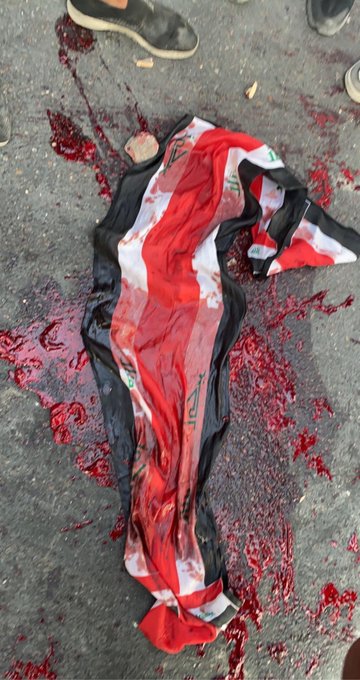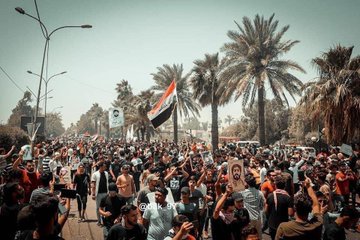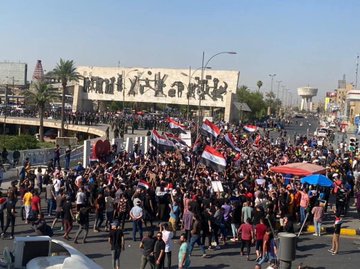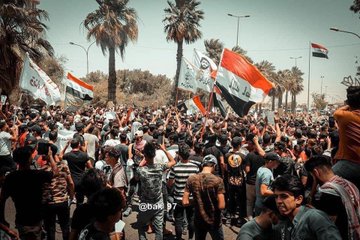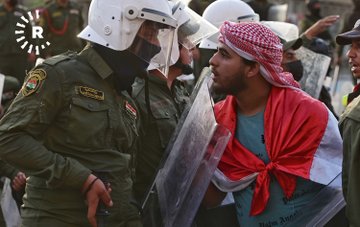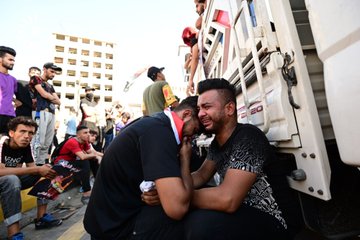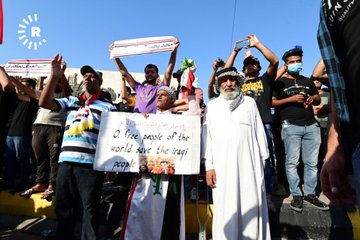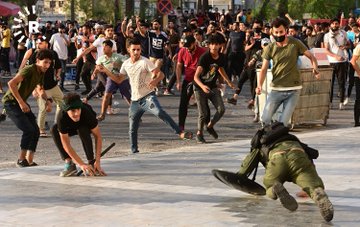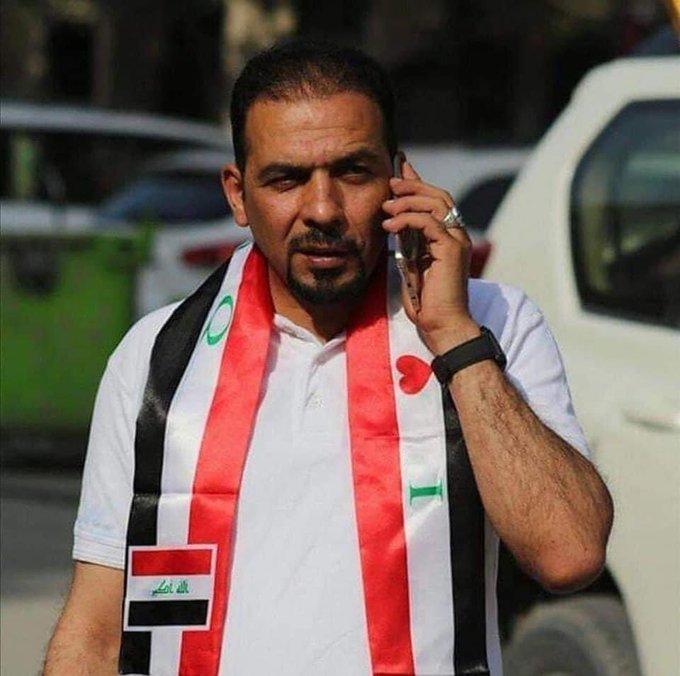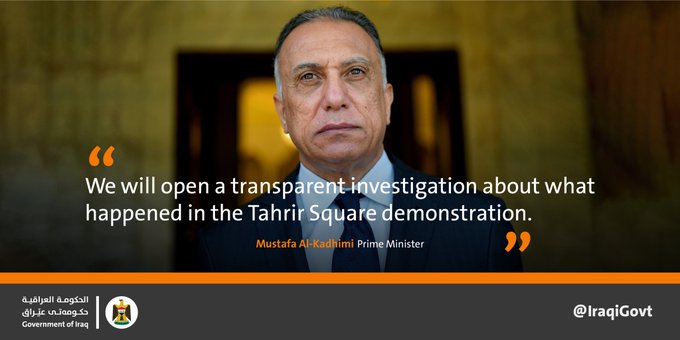Eddie e-mailed wondering what songs I was listening to? I usually stream on YOUTUBE for a single song. Here are the five I've been hitting hard this week -- and they aren't new.
1) Demi Lovato's "Sorry, Not Sorry."
2) George Ezra's "Paradise."
3) Mary J. Blige's "Just Fine."
4) Sam Smith's "Burning"
5) Jess Glynne's "Thursday."
Those are five songs I love that I've been listening/streaming on YOUTUBE>
If I'm listening to an album, I stream with AMAZON (or use a CD player or vinyl record player).
Closing with C.I.'s "Iraq snapshot:"
Wednesday, May 26, 2021. At least two dead and hundreds injured in the Baghdad protest that took place Tuesday.
Yesterday, across Iraq, the people took to the streets to honor the many protesters who have been assassinated since The October Movement began in 2019. The government responded? By killing more of them.
And, no, Alanis, that's not ironic -- it's just tragic and criminal. Seth J. Frantzman (JERUSALEM POST) observes, "As if to show that there is complete impunity for killing civilians in Iraq, the forces shot the very people who were angry that people are being targeted and killed. In short: If you protest in Iraq they will shoot you. If you are an activist you will be hunted down by militias, many of them linked to Iran, and killed."
Jordan's ROYA NEWS notes, "Wednesday, the hashtag ‘Iraq is uprising’ topped the list of trending hashtags on Twitter after an Iraqi protester was killed Tuesday by security forces' bullets and at least 13 others were injured by tear gas following clashes that occurred due to mass protests that took place in Tahrir Square in Baghdad." This morning, #IRAQILIVESMATTER is trending on social media. Hawraa is among those using the hashtag:
As does Mohamed 2020:
Protests took place throughout Iraq (and Iraqis in Germany also demonstrated). The photos in Mortada's Tweet capture how large the turnout was in Baghdad:
RUDAW also offers photos testifying to the large turnout.
Jane Arraf (NEW YORK TIMES) sets the scene:
“Who killed me?” the signs asked, alongside images of dead men and women, among the roughly 80 Iraqi activists murdered since late 2019. Young demonstrators held aloft the posters in Baghdad’s Tahrir Square on Tuesday, illustrating both the enduring spark and diminished strength of Iraq’s anti-government protest movement.
The demonstrators (publicly) and Iraqi officials (privately) say they know who killed many of the activists: Iran-backed militias that have essentially crushed a grass-roots anti-corruption movement that blames Iranian influence, and the militias, for many of Iraq’s ills. In a country where militias — nominally a part of the security apparatus — operate with impunity, the killers have gone unpunished.
The several thousand young men gathered in Baghdad’s central square Tuesday constituted the biggest protest in the Iraqi capital since the anniversary last October of demonstrations in 2019 that swept Baghdad and southern cities and brought down a government. The movement is driven by anger at the government’s failure to make promised reforms, including curbs on Iranian-backed militias.
Suadad al-Salhy (MIDDLE EAST EYE) reminds, "Those protests, which erupted due to widespread corruption, a lack of jobs and an out-of-touch political class, resulted in the resignation of Prime Minister Adel Abdul Mahdi."
Mohammad Baker from the southern town of Diwaniya died in al-Kindi hospital from a gunshot wound in the neck, a medical source said.
Waving portraits of victims, gunned down with silencers by unknown assailants, the demonstrators converged on the Iraqi capital's main squares including Tahrir, as police were deployed in force.
"Revolution against the parties," they chanted.
"Who killed me?" banners read.
AFP notes these numbers, "Two Iraqis were killed and 28 others were injured in clashes Tuesday as thousands protested in Baghdad to demand justice over a wave of deadly attacks on pro-democracy activists and journalists." Of the two killed, Louisa Loveluck (WASHINGTON POST) explains, "One of the young men killed in Tahrir Square yesterday was born the year the US invaded Iraq. 18 years on, he was shot demonstrating against the corrupt and unaccountable political system that occupation helped install."
The killings never end. NRKHWND notes:
The assassinations refer strictly to those hunted outside of a protest. If you include the Iraqis that have been killed since this movement against corruption began in the fall of 2019, you are looking at hundreds.
FACEBOOK offers this translation from IHCHR:
AP quotes activist Kamal Jaban stating, "Today’s protests took place because the weak government did not keep its promises to bring the murderers to justice." Sofia Barbarani (ALJAZEERA) quotes activist Laith Hussein declaring of the demonstrations, "This is a response to a call of Ihab al-Wazni’s family … and to object against a political system that is not truly democratic but pretends to be. We want to get rid of the parties in power, [we want] real freedom, true democracy and to make radical changes to this system." Ihab was assissanted earlier this month. KIRKUK NOW Tweeted about him May 9th:
At their official Twitter feed, the Iraqi government offers:
Take that assertion seriously? With Mustafa's history of doing nothing?
Mina Aldroubi (THE NATIONAL) reports:
The human rights community for over a year has been warning the government that if there is no accountability for the horrific assassinations, kidnappings, threats and other attacks, the protest movement will not go away, Belkis Wille, a senior researcher on Iraq at Human Rights Watch said.
“Protesters will be more and more galvanised by calls for accountability and justice and people on the streets will continue to remain angry that their government has been completely unable to bring killers to account,” Ms Wille told The National.
“As long as accountability isn't delivered by the government I think that protests will continue,” she said.
Although the government has said that it has ordered armed forces to not use violence and live ammunition against protesters, that has not been the case.
“This instance really begs the question of the extent to which the prime minister can actually fulfil his role as commander in chief and to which security forces are actually doing what the prime minister is ordering them to do,” she said.
Amnesty's Donatella Rovera notes a paradox:
The following sites updated:



